The Thaumaturge brings your inner demons into the limelight. The RPG puts you in the shoes of Wiktor Szulski, a Thaumaturge who can yield the power of demons, called Salutors, and manipulate the minds of those around him. Fool’s Theory articulately brings 1905 Warsaw, Poland to life in the game. You’ll be investigating the intricacies of politics and high society in a time of Russian expansionism, and the monsters that lurk in the dark are yours to find. So, buckle up for an alternate history filled to the brim with the occult.
Demons Galore
The historical setting appropriately sets the stage for the bizarre adventure ahead. In a world where mythological beasts can become my minions, I found an ideal balance of good and evil in the shadows. From the get-go, you’ll be seeking out demons that have wreaked havoc on people’s lives. You’ll need to ‘rescue’ individuals plagued by Salutors by fighting them through a boss battle. These fights are turning points in the story, and crucial to progress in the game. You’ll turn these Salutors dripping in evil, into your trusty combat companions. So, while it is self-serving to rescue individuals from Salutors, it is nonetheless a good deed. Of course, no good deed goes unpunished.
Every time Wiktor tames a Salutor, he’ll need to meet with Rasputin (Yes… that one) to heal from the ordeal. Wiktor will physically degrade from the mentally draining fight, and Rasputin has the power to heal his psyche. While this made sense in the beginning, it felt a bit unnecessary to chase down Rasputin to tame my Salutor time and time again. Despite Wiktor being plagued by demons, he’s still able to rally for a fight. Plus, a Thaumaturge is meant to tame these beasts, so why does he need the aid of another? Regardless, I never grew tired of chasing new monsters down. There are eight Salutors total, and each comes with its very own set of combat skills and abilities.
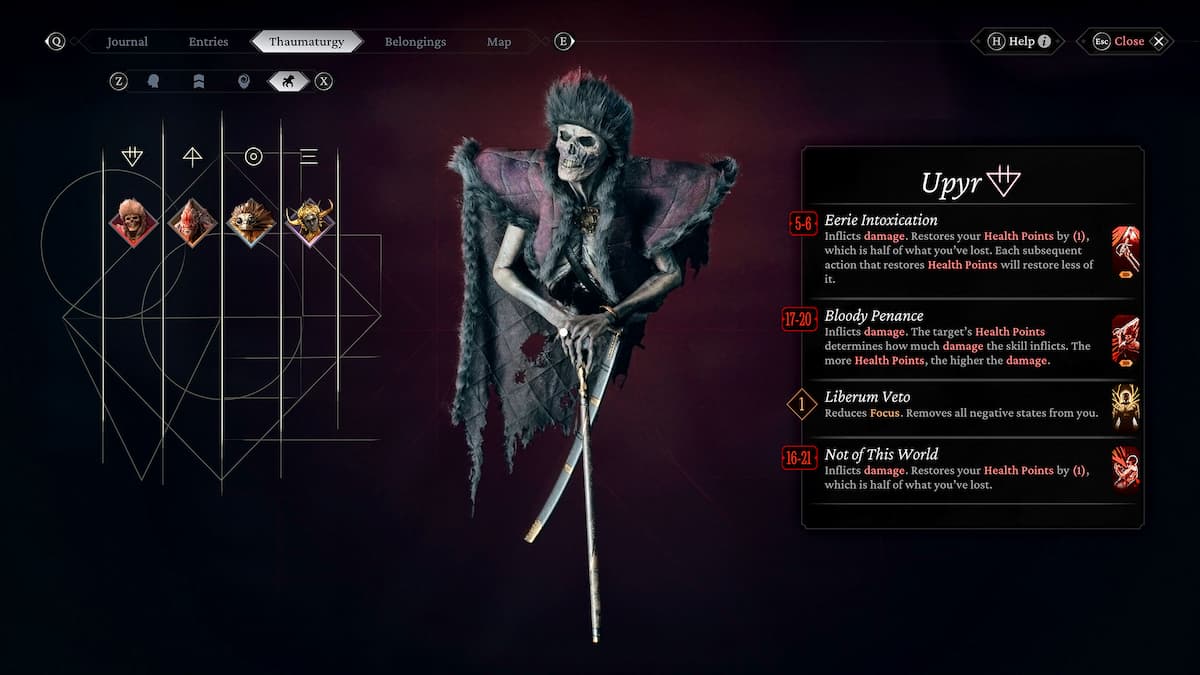
The game features Four Dimensions that are broken down into Thaumaturgy abilities: Heart, Mind, Deed, and Word. Each category has two Salutors and a skill tree. You’ll level up your Salutors through its Dimension skill tree by unlocking new, stronger skills. For instance, Heart features your first Salutor, Upyr. Upyr’s abilities are health regeneration-focused, so you’ll unlock enhancements for those abilities. Bukavac, your second Salutor, is from the Deed tree. Bukavac’s abilities are focused on the suffering state, leaving your enemies susceptible to quick and powerful attacks. So, you’ll need to strategize when and how to utilize your Salutor’s particular skills. Thankfully, you can swap them out freely in combat, which adds to the layers of strategy — and you’ll need to strategize.
Four Dimensions of Combat
The game’s combat took me by surprise with its intricacies. It’s entirely turn-based with your standard strategy of timing and picking your next best move. Wiktor has his own set of abilities, as does each Salutor, so there’s plenty to choose from. Despite appearing simple from the start, the game’s combat system is unique, and rewarding in its ever-increasing complexity.
Each Salutor brings a fresh combat strategy to the table. As I mentioned above, Heart is focused on health regeneration, and Deed is focused on the suffering state. The Salutor Lelek is of the Mind tree, and you’ll find that their abilities are solely for depleting enemy focus and removing negative traits from Wiktor. For example, the attack Mournful Tones removes focus from the enemy and transfers all negative states from Wiktor to them. Once you get an enemy’s focus meter to zero, you can easily take them out with powerful attacks. When learning the Word skills, you’ll eventually unlock the Salutor Veles. Veles is capable of removing enemy buffs, and healing Wiktor. However, all of Veles’ attack abilities are luck-based. So, it’s a roll of the dice for this one.
All in all, the combat system with the Salutors takes some practice. However, once I gained an understanding of the Four Dimensions, I felt myself favoring some above others. For instance, Bukavac quickly took the backseat when I unlocked Lelek’s focus-based system. And Veles’ luck-based system never really felt worthwhile. Additionally, Upyr’s ability to guarantee health regen while dealing damage remained worthwhile so I was reliant on Upyr throughout my time playing. All things considered, the four categories break up the options for players in a cohesive way that leaves you with plenty of options.
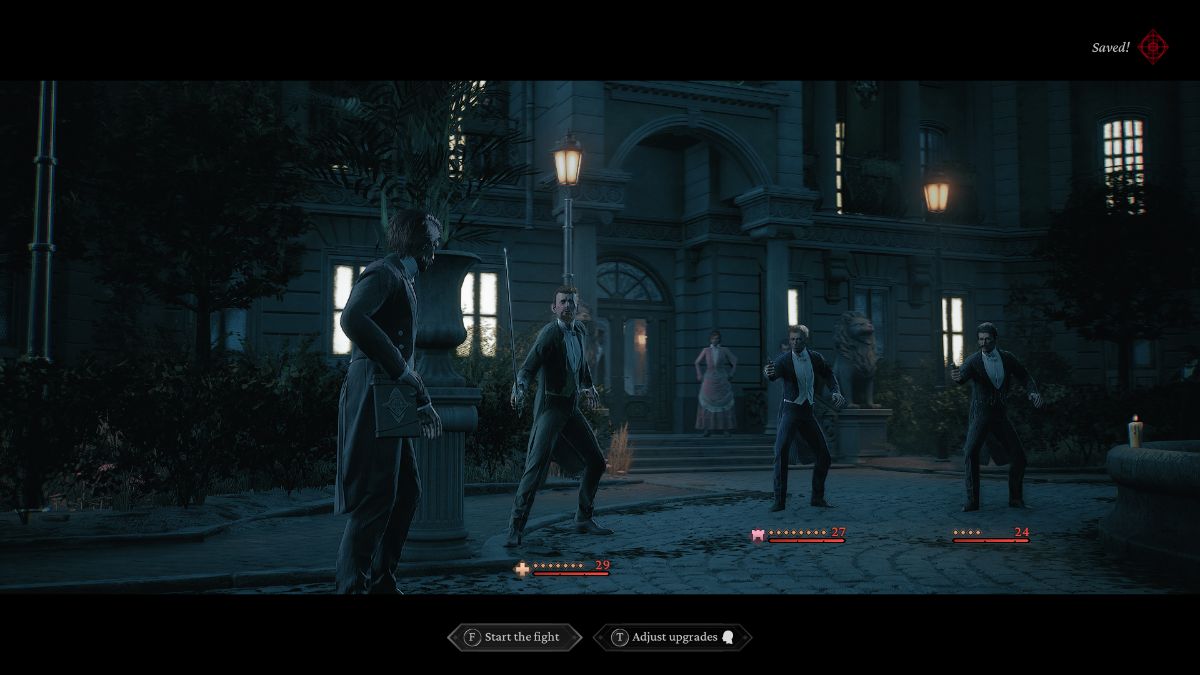
On the whole, I was surprised by how challenging combat could be. Losing several fights early on underscored the importance of mastering the strategies at hand. Furthermore, when you focus on all that the combat system has to offer, replayability becomes apparent. In my playthrough, I focused on staggering enemies with the Suffering State and aiding myself with healing abilities. Of course, I could offer myself a greater challenge in future playthroughs by removing healing from the table. So, whether it’s to play through different choices or combat scenarios, replayability is definitely on the table for The Thaumaturge.
Clue Into the Narrative
The Four Dimensions will have an impact on your detective skills, too. You’ll be seeking out clues in the world’s objects when completing main or side quests. Your Thaumaturge abilities will help you identify the clues, but sometimes, you need to level up certain talents to interact with them. So, there’s potential to meet a roadblock until you level up a certain skill tree. This is because each clue is tied to one of the Four Dimensions. Clues related to Heart will be affected by someone’s desires and emotions. Mind will be related to secret thoughts and ideas. Deed clues relate to an action someone took, while Word clues are related to spoken words or written letters.
The clues are where the attention to detail shines through. While general dialogue and choice-based conversations are crucial to the plot, the clues are my favorite dose of narrative. Each one tells the story of the person it’s connected to. For example, a Tiled Stove at first glance means nothing, but upon approach, it becomes clear that it’s layered in soot and the remnants of a letter burned by the unsteady hands of a threatened woman. If you’re a fan of in-game lore and reading all things story, there’s plenty to find in The Thaumaturge.
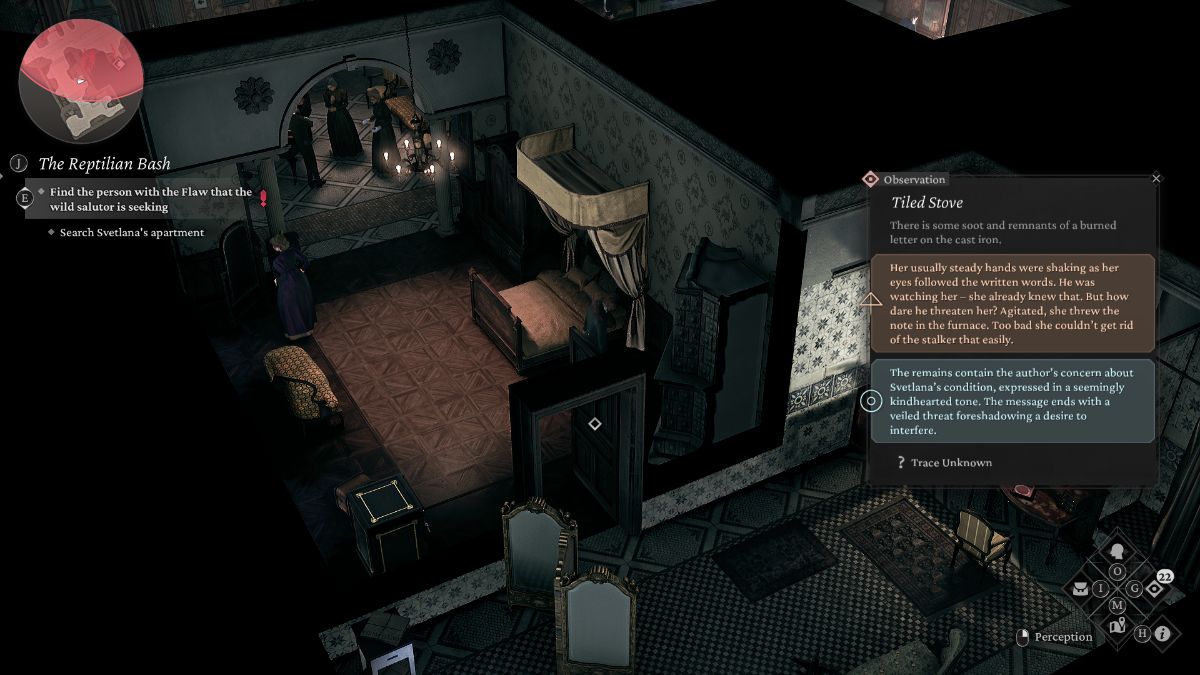
Speaking of story, I found it could drag on at times. I was a little too aware of time spent wandering the streets between objectives, and sometimes combat instances felt a bit out of place in the narrative. Thankfully, each environment is beautifully crafted and there are interactive moments throughout, like watching a street Violinist, or sipping some Absinthe, that make the world feel alive. Nevertheless, I consistently found myself more keen on the combat and clues than the overarching plot.
Lastly, the game’s choice consequence system feels effortless. While I consistently chose to feed my Pride flaw throughout my playthrough, I never felt like I was being unfairly punished. Whether I wanted to poke fun at a socialite or act selfishly, the choice was mine. At most, I was unable to pursue a particular dialogue option because of my previous decisions. However, I never felt hindered by the choices I made, only more certain that I was free to play the game however I wanted. In a way, this does make the consequences of your choices feel rather inconsequential. Even so, being roadblocked by past decisions leaves me wondering what the road left untraveled has in store for my next playthrough of The Thaumaturge.
When it comes down to it, I had a great time with The Thaumaturge. There’s plenty to be discovered, and I found myself seeking out clues again and again. The thaumaturge abilities bring unique and memorable detective gameplay, and a seemingly simple turn-based combat system grows in complexity with every hour invested into the game. The historic setting oozes with intrigue and seduces you into a world of political “haves” and “have-nots”. However, the story occasionally suffers from sluggish pacing. Nevertheless, if you’re willing to stick it out, it’s a bizarre adventure worth your time.
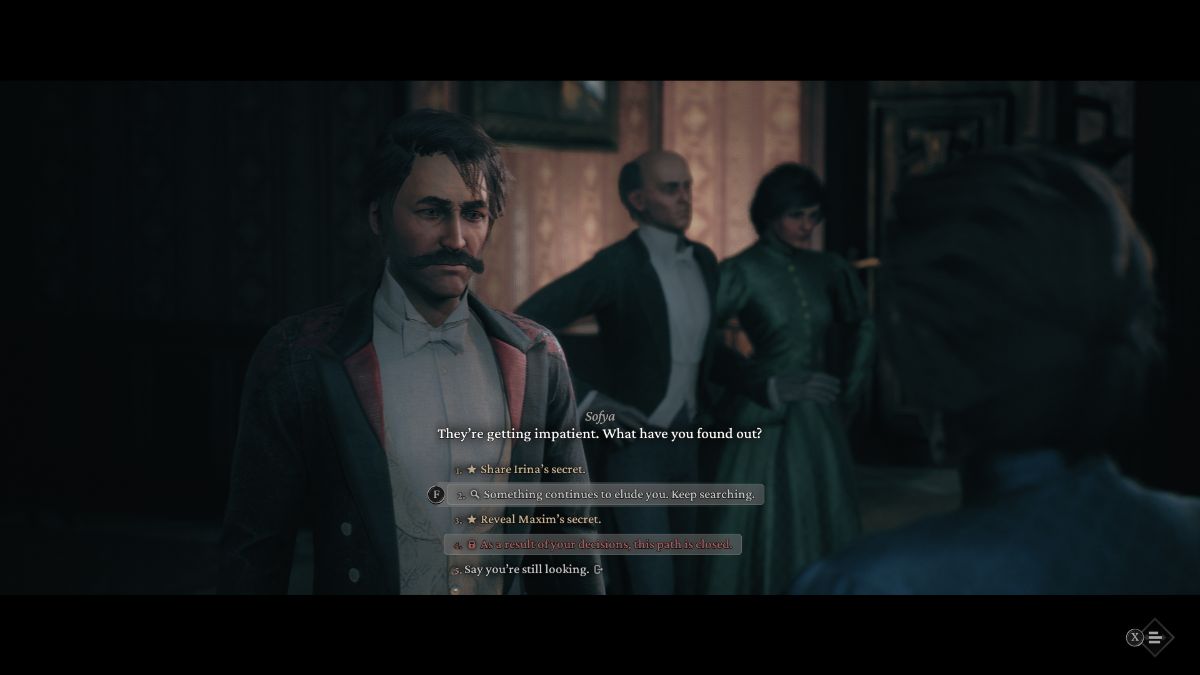
The Bottom Line
Pros
- A fresh take on a historical RPG that consistently surprises.
- Combat is interesting and strategic.
- Clues and choice consequences bring a well-rounded experience.
Cons
- The story felt sluggish at times.
- Combat instances sometimes felt out of place.
- Wiktor needs to chase down Rasputin to tame Salutors.
The Thaumaturge successfully delivers a weird and surprising take on a historical RPG. While the game’s various mechanics at times felt out of sync, it’s a unique and memorable gaming experience that I won’t forget anytime soon.

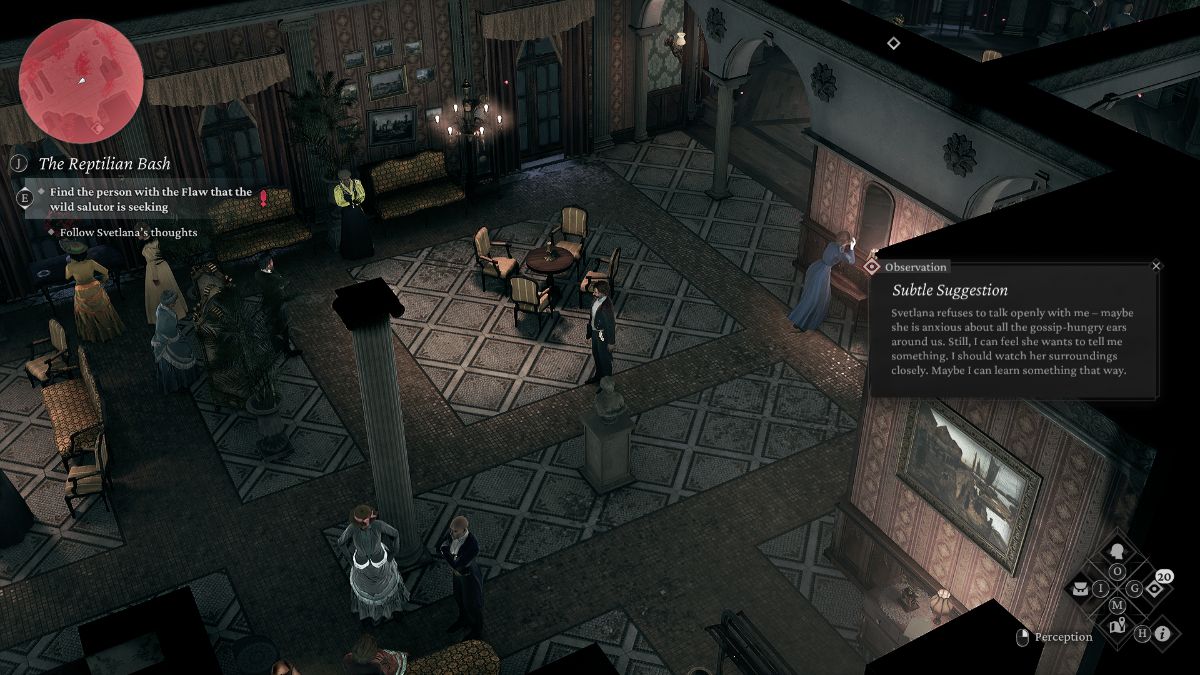





Published: Mar 5, 2024 06:55 am